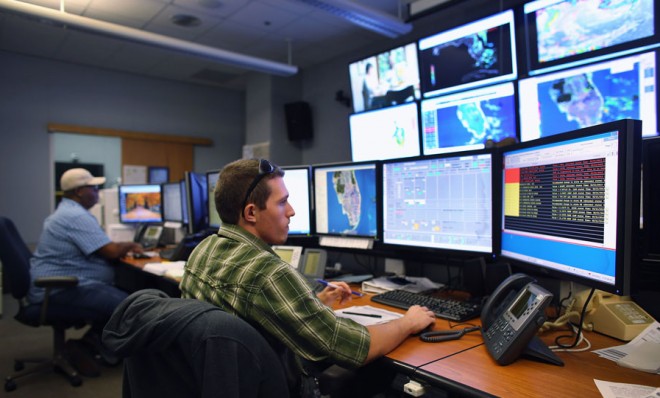America may be in for another brutal hurricane season
NOAA is predicting up to six major storms. A typical year has only three.


A free daily email with the biggest news stories of the day – and the best features from TheWeek.com
You are now subscribed
Your newsletter sign-up was successful
We could be in for an extremely active hurricane season this summer, according to the National Oceanic and Atmospheric Administration.
NOAA's Climate Prediction Center projected Thursday that 13 to 20 named storms would develop over the Atlantic Ocean during the season, which begins June 1 and lasts through November. As many as 11 could become hurricanes, and up to six of those could be major hurricanes with winds of 111 miles per hour or more.
In the typical year, there are only three major storms.
The Week
Escape your echo chamber. Get the facts behind the news, plus analysis from multiple perspectives.

Sign up for The Week's Free Newsletters
From our morning news briefing to a weekly Good News Newsletter, get the best of The Week delivered directly to your inbox.
From our morning news briefing to a weekly Good News Newsletter, get the best of The Week delivered directly to your inbox.
The warning, coming after the monster tornado that devastated Moore, Okla., is fueling fears that the U.S. is in for more pummeling from extreme weather along the lines of the freakish atmospheric cocktail that spawned Superstorm Sandy, which slammed into the Mid-Atlantic coast last year. Some blame climate change, others an unlucky weather cycle. Either way, notes Jon C. Ogg at 24/7 Wall St., the forecast "is not good news for those of us who live within 50 to 150 miles of the coast in the Gulf of Mexico or along the Eastern Seaboard."
How bad do things look out in the Atlantic? NOAA says there's a 70 percent chance of an above normal hurricane season, and only a 5 percent chance of a below normal season. That's because the west African monsoon is wetter and warmer than the historical average, so we can expect to see more thunderstorms than usual churning west from Africa into the Atlantic. Those storms can strengthen and become hurricanes when they move over warm ocean waters, and the probability that they'll strengthen will be increased this year, because water temperatures in the Atlantic are higher than usual.
Another factor is that the waters of the Pacific are cooler than usual this year. That means no El Nino — a phenomenon that reduces hurricane activity in the Atlantic.
Here, Gerry Bell of NOAA's Climate Prediction Center explains the projections:
A free daily email with the biggest news stories of the day – and the best features from TheWeek.com
There's some comforting news buried in NOAA's announcement, though. The agency is offering a range of the number of storms that could develop — not how many will hit land. So there's always a chance that the worst storms won't hit shore.
Still, emergency management officials say people in vulnerable areas should work to ensure they'll remain safe if a powerful hurricane barrels ashore. "This is a very dangerous hurricane season, and if you're not prepared…you're likely to be a statistic," Joe Nimmich, who leads response and recovery for the Federal Emergency Management Agency, tells The Wall Street Journal.
The worst part of hurricane season, as usual, is expected to hit in August and September, so NOAA will update its projections in early August.
"With the devastation of Sandy fresh in our minds and another active season predicted," acting NOAA administrator Kathryn D. Sullivan tells The New York Times, "everyone at NOAA is committed to providing lifesaving forecasts in the face of these storms and ensuring that Americans are prepared and ready ahead of time."
Harold Maass is a contributing editor at The Week. He has been writing for The Week since the 2001 debut of the U.S. print edition and served as editor of TheWeek.com when it launched in 2008. Harold started his career as a newspaper reporter in South Florida and Haiti. He has previously worked for a variety of news outlets, including The Miami Herald, ABC News and Fox News, and for several years wrote a daily roundup of financial news for The Week and Yahoo Finance.
-
 5 cinematic cartoons about Bezos betting big on 'Melania'
5 cinematic cartoons about Bezos betting big on 'Melania'Cartoons Artists take on a girlboss, a fetching newspaper, and more
-
 The fall of the generals: China’s military purge
The fall of the generals: China’s military purgeIn the Spotlight Xi Jinping’s extraordinary removal of senior general proves that no-one is safe from anti-corruption drive that has investigated millions
-
 Why the Gorton and Denton by-election is a ‘Frankenstein’s monster’
Why the Gorton and Denton by-election is a ‘Frankenstein’s monster’Talking Point Reform and the Greens have the Labour seat in their sights, but the constituency’s complex demographics make messaging tricky
